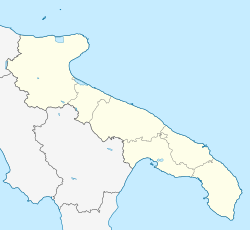This article needs additional citations for verification. (September 2024) |
Taranto
Tarde (Neapolitan) | |
|---|---|
| Comune di Taranto | |
From the top, left to right: San Francesco de Paola Bridge and the Taranto Cathedral; City hall and the Aragon Castle; and the Palace of Government | |
| Coordinates: 40°28′16″N 17°14′35″E / 40.47111°N 17.24306°E | |
| Country | Italy |
| Region | Apulia |
| Province | Taranto (TA) |
| Frazioni | Talsano, Lido Azzurro, Lama, San Vito, San Donato |
| Government | |
| • Mayor | Rinaldo Melucci (from 29 June 2017) (IV) |
| Area | |
| • Total | 249.86 km2 (96.47 sq mi) |
| Highest elevation | 431 m (1,414 ft) |
| Lowest elevation | 3 m (10 ft) |
| Population (31 August 2017)[2] | |
| • Total | 198,585 |
| • Density | 790/km2 (2,100/sq mi) |
| Demonyms |
|
| Time zone | UTC+1 (CET) |
| • Summer (DST) | UTC+2 (CEST) |
| Postal code | 74121, 74122, 74123 |
| Dialing code | (+39)099 |
| Patron saint | Saint Catald of Taranto |
| Saint day | 10 May |
| Website | Official website |
Taranto (Italian pronunciation: [ˈtaːranto] ; Tarantino: Tarde)[a] is a coastal city in Apulia, Southern Italy. It is the capital of the province of Taranto, serving as an important commercial port as well as the main Italian naval base.[5]
Founded by Spartans in the 8th century BC during the period of Greek colonisation, Taranto was among the most important poleis in Magna Graecia, becoming a cultural, economic and military power that gave birth to philosophers, strategists, writers and athletes such as Archytas, Aristoxenus, Livius Andronicus, Heracleides, Iccus, Cleinias, Leonidas, Lysis and Sosibius. By 500 BC, the city was among the largest in the world, with a population estimated up to 300,000 people.[6][7] The seven-year rule of Archytas marked the apex of its development and recognition of its hegemony over other Greek colonies of southern Italy.
During the Norman period, it became the capital of the Principality of Taranto, which covered almost all of the heel of Apulia.
Taranto is now the third-largest continental city in southern Italy (south of Rome, roughly the southern half of the Italian peninsula), with well-developed steel and iron foundries, oil refineries, chemical works, naval shipyards and food-processing factories. Taranto will host the 2026 Mediterranean Games.
- ^ "Superficie di Comuni Province e Regioni italiane al 9 ottobre 2011". Italian National Institute of Statistics. Retrieved 16 March 2019.
- ^ "Popolazione Residente al 1° Gennaio 2018". Italian National Institute of Statistics. Retrieved 16 March 2019.
- ^ Eric Partridge (1966). Origins: a short etymological dictionary of modern English. Routledge & Kegan Paul. p. 695. ISBN 9780710019349. Archived from the original on 14 September 2022. Retrieved 12 December 2014.
- ^ Gigante, Nicola (2002). Dizionario della parlata Tarantina (in Italian and Neapolitan). Mandese editore. p. 850.
- ^ "Port of Taranto". World Port Source. Retrieved 16 September 2011.
- ^ Oppenheimer, Michael (1 January 2002). The Monuments of Italy: A Regional Survey of Art, Architecture and Archaeology from Classical to Modern Times. Tauris. ISBN 9781860645709. Archived from the original on 13 March 2022. Retrieved 26 December 2016 – via Google Books.
- ^ Halsey, William Darrach; Friedman, Emanuel (1 January 1986). "Collier's Encyclopedia, with Bibliography and Index". Macmillan Educational Company. Archived from the original on 14 September 2022. Retrieved 26 December 2016 – via Google Books.
Cite error: There are <ref group=lower-alpha> tags or {{efn}} templates on this page, but the references will not show without a {{reflist|group=lower-alpha}} template or {{notelist}} template (see the help page).









